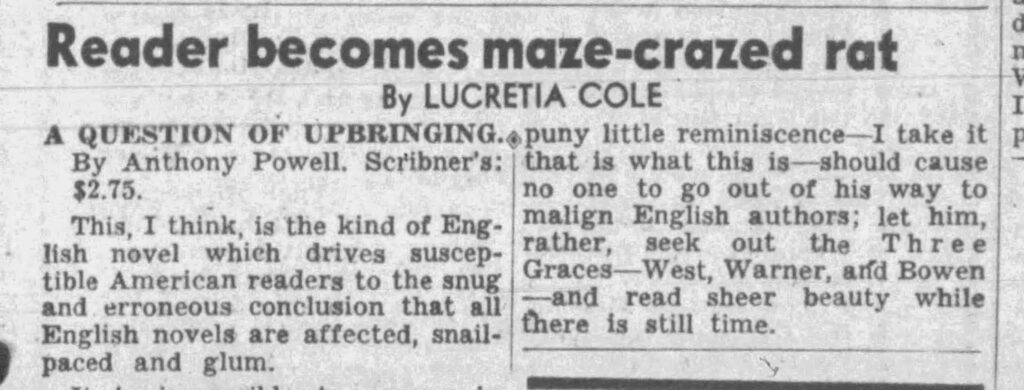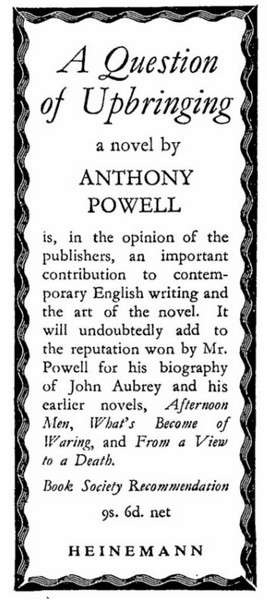
M. P. R., The Birmingham Post, 23 January 1951
The last novel by Mr. Powell was published in 1939, and it is with curiosity and excitement that one opens his new one. Apparently it is the first of a series of semi-autobiographical volumes (presented as fiction) in which he will cover the period of the last 30 years. Beginning at Eton and ending at Oxford, the book depicts, with classical restraint, the tragedy and comedy of human development at these academies and the marvellous diversity of its forms. Wise, entertaining, beautifully composed, and written with a rare clarify and grace, it is an outstanding work.
John Betjeman, The Daily Telegraph, 26 January 1951
I find Anthony Powell as funny a writer as Evelyn Waugh and Sir Max Beerbohm. He is not like them, but he makes me laugh as much. Nor is he a humorist of the poetic-nonsense sort like Wodehouse. Perhaps he can best be described as the exact opposite of the American “crazy” type of humorist [e.g., S. J. Perelman] whose style originated in the New Yorker and has now infected even Punch….
Mr. Powell’s theme is that human relationships change every seven years as painlessly and inevitably as we change our skins. Painlessly and inevitably he has separated the three friends in a book which is at the top of its class for all of us who like our wit dry.
George Malcom Thomson, Evening Standard, 23 January 1951
A modest and distinguished novel which is both witty and sensitive. Let its casual air deceive nobody. Here is the breath of life and the presence of a strong, although shy, temperament.
It is a novel about a public school (Eton?), about a French pension and about Oxford. And about the friends and relations of young Jenkins, the narrator. It is even about Jenkins himself, but not very much….
Recommended to those who prefer their fiction to be intelligent and do not object if it is rather loose in the joints.
Hugh l’A. Fausset, The Manchester Guardian, 26 January 1951
An author with a highly developed talent for observing people from an ironic angle. The talent is too continuously and exclusively exercised and degenerates at times into mere sarcasm…. Mr. Powell’s style, if sometimes too elaborately detailed, is civilised and accomplished, and he blends happily the immediate and the retrospective.
Francis Wyndham, The Observer, 4 February 1951
Mention on the blurb of “subsequent volumes” confirms the hope that A Question of Upbringing is to be the first of a series; self-sufficient as it stands, it has a promising air of being a prelude, for it introduces a collection of people and ideas so suggestive that one can hardly wait to read of their development in a sequel. The perfectly balanced construction forms a simple design that could bear many reqarding variations. This distinguished book is intensely enjoyable; when its successors appear its importance in modern literature will clearly emerge, and this may well be considerable.

Barbara Worsley-Gough, The Spectator, 9 February 1951
The candour and the reserve of the sophisticated schoolboy, the antics of the almost adult social animal, have attracted many competent writers to employ in this study talents which might be put to better use. If the thing is to be done at all it must be done coolly, delicately, with the lightest of light touches, and all this Mr. Anthony Powll manages with apparent lack of effort. His schoolboys of the nineteen-twenties are, on the whole, entertaining creatures, and their approach to realities, cautious in some cases and headlong in others, is shrewdly observed. But I cannot help thinking that by this time they have become a collection of perfectly detestable middle-aged men.
Julian Maclaren-Ross, The Times Literary Supplement, 16 February 1951
A Question of Upbringing is Mr. Powell’s first novel for 12 years, and both its manner and approach are markedly dissimilar from those characteristic of the earlier work. In spite of the stylistic brilliance of the previous books the reader may find himself unprepared for the distinguished classical prose and rounded periods of the new novel; in composing long sentences Mr. Powell has skilfully avoided the morass of circumlocution into which Mr. William Faulkner has lately floundered: his meaning remains as sharp and clear as in the curt paragraphs of Afternoon Men….
It is to be hoped that the author will allow us, in the future, further glimpses of his characters’ development: a reference to the reappearance of Sunny Fairbrother, 20 years ahead, in the life of the narrator, seems to promise a sequel at some date to come; but, be this as it may, the present volume, whether considered as the study of the obsequious and the self-seeking, a brilliant comedy of manner, or an analysis of the doom of youth, cannot fail to be regarded as a triumph in its own right.
Mr. Powell is, mercifully, a writer without a “message,” either philosophical, religious, or political; he is content to examine without comment and to illustrate through character in action, the changes in human nature brought about by the changing face of the social order in which we live: in other words, he is attempting to fulfil the novelist’s only true function.
Rupert Croft-Cooke, The Sketch, 28 March 1951
It is about three public schoolboys and an earnest ass named Widmerpool, and it tells with pleasantly polysyllabic irony of the trio and their housemaster Le Bas… It is all delightfully inconclusive and without any dour significance, but it is to be read for the gay inconsequence of its episodes. Mr. Powell seems frequently to forget what he is writing about, but he never grows wearisome. His literary affiliations seem to be with Henry James and Evelyn Waugh, a happy combination which produces something entirely his own. My only moment of foreboding was when I read in the blurb of A Question of Upbringing “and subsequent volumes.” A series of sequels would, I feel, be too much of what is certainly a good thing.
L. V. Kepert, The Sydney Morning Herald, 15 September 1951
It is, if the publishers are accurate, the first in a series in which Anthony Powell will look at “the last strange three decades.” But that strangest of decades, the 1920s of the “lost generation,” assumes an unusual hue through his eyes. The eccentrics and the Bohemians and the fevered pleasure-seekers and power-seekers are all there, only they are seen through a brown atmosphere which, while completely devoid of sentimentality or yearning for the past, manages to take the sharp edge off the barb of satire….
Anthony Powell has said that he himself has a taste for “looking out of the window in the hope of seeing something of interest, a bad habit which I have never been able to overcome.” That may well be so, and there is no doubt that he makes adroit use of that habit, and catch the scene with his own careful phrases for us to see ourselves. But that mere photographic ability would be nothing without his teasing capacity to capture a mood.
Lucretia Cole, Los Angeles Daily News, 25 August 1951
This, I think, is the kind of English novel which drives susceptible American readers to the snug and erroneous conclusion that all English novels, are affected, snail-paced and glum. It is impossible to convey in mere words the tedium of Anthony Powell’s prose. Occasionally, a philosophic notion or descriptive passage of some worth appears on the printed horizon but by then, the reader, like a maze-crazed rat, can’t distinguish true values very clearly…. That Anthony Powell has written a puny little reminiscence — I take it that is what this is — should causee no one to go out of his way to malign English authors: let him rather, seek out the Three Graces — West, Warner, and Bowen — and read sheer beauty while there is still time.